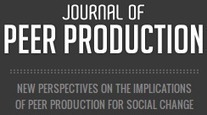 Your new post is loading...
The Book of Peer Production has been released as a special edition of Journal of Peer Production. It consists of papers written by presenters at the Peer Production-track at the Free Society Conference and Nordic Summit (FSCONS) in Göteborg 2014. It is cool, that all content in the book is in the public domain.
Unless technologies are explicitly designed to reduce inequality, they wind up exacerbating it. Reflections on Yochai Benkler's closing remarks at Ouishare.
It's indeed a remarkable synthesis of where the P2P movement is at, and how it is both grappling with the tensions in the world and within the movements.
A recent article on a Society of the Commons co-authored by Michel Bauwens, Vasilis Kostakis, Alex Pazaitis.
In the context of the Ecuadorian transition project towards a open commons-based knowledge society, see Floksociety.org, and to complement the prior analysis of three competing economic models in the age of peer production, I have formulated some transition proposals, on how to get from Phase 2, emerging peer production in the context of the dominance... Continue reading →
A primer on the basics of the Blockchain and its potential to facilitate remittances, financial inclusion, cooperative structures and microinsurance systems
The FairCoop team is pleased to announce that the FairMarket has now officially entered its beta phase, which means that it is fully functional as a market, and we invite interested individuals and organisations to come and test it out, either as...
In this age of peer production, new technologies allow students, teachers, and writing program administrators to talk to and write with one another and assess writing in transformative ways. Teaching and learning are changing, as learning transcends the classroom walls, facilitating new networks, connections, and collaborations.
The industrial revolution concept first appears mainly in Arnold Toynbee and Engels. It is primarily used to describe the upheavals of the late eighteenth and nineteenth century. It is the affirmation of capitalism, the industrialization of Great-Britain, of Europe and the United States. But beyond this specific reality, today it's a more general concept, which is frequently used. Basically we can say that it means a major upheaval of the techniques and means of production, but with the specificity that these changes have an impact on almost all aspects of economic and social life. There are constantly technological changes in capitalism and some of them disrupt important specific aspects, but in reality we can only speak of a technological or industrial revolution when the upheavals caused concern most aspects of economic and social life in general. In this sense we can say that there have been so far two major technological revolutions in capitalism. The first began in the late eighteenth century with the steam engine, railways, etc. The second is electricity, which appeared straddling the nineteenth and twentieth centuries.
“We believe that a new economy cannot be built in vacuum. We see this as a process of metamorphosis. The ethical and aware classical players will join first to transfer their classical store value and production assets into new assets. This is in essence a transfer of resources from the old economy into the new. …
A thought module proposed by Bob Haugen, via email: “Most such discussions (about Economic Calculation) miss what I talked about here: The short version is that the people who are still talking about the calculation problem do not seem to understand how planning and replanning is done now in capitalist supply chains (as well as …
Two days ago, we presented the article by Seth Ackerman in which he presented the ‘economic calculation problem’ and various solutions to it, ending his argument with a call for a form of socialized finance which would respect the autonomy of the firm. For a more in-depth understanding, see how I have processed his arguments …
|
Michel Bauwens (Madison, Wisconsin), June 12, 2016: Part One – Analyzing the global situation One of the best books I have read in the last ten years is undoubtedly, The Structure of World History, by Kojin Karatini.
COMMONS TRANSITION CULTURE & IDEAS ECONOMY AND BUSINESS INTEGRAL THEORY P2P BOOKS P2P HIERARCHY THEORY P2P SUBJECTIVITY P2P THEORY PEER PRODUCTION PEER PROPERTY
“Both brokering and boundary-spanning roles greatly increase the likelihood of leadership points to the importance of social positions that can unite open innovation communities. We argued that trust does not come easily to community members who fear cooptation by commercial interests or forking over technical disagreements. Because brokers by definition contrive less cohesive and less trusting contexts, the probability that they will assume leadership roles remains highly contingent on building trust with community members. We argue that aspiring leaders can build trust through physical attendance and, consistent with this argument, find a positive interaction with physical attendance. Also consistent with our emphasis on trust in open innovation communities, brokerage and boundary spanning demonstrated a negative interaction, indicating that brokers who span boundaries remain at a disadvantage. While brokerage alone demonstrates positive influence on becoming a leader, boundary spanning demonstrates a much stronger effect. Finally, we did not observe a contingent relationship between boundary spanning and attendance. Our results emphasize the importance of intermediary and integrating roles—for brokers within technological boundaries, and for boundary spanners across cohesive technological boundaries."
A bit of context: * today we have immaterial commons accumulation in the sphere of common knowledge, code, and design, through the contributions of volunteers, paid labor, and commons-supportive-for-profit-companies * however, it is impossible to socially reproduce oneself (read: ‘survive’) by contributing to the commons outside of the sphere of capital accumulation (read: you have... Continue reading →
One of the most useful non-Marxist schools is the post-capitalist model of commons-based peer production exposed by Michel Bauwens, from the P2P Foundation.
On the convergence of the blockchain and the commons, with the blockchain as the new institutional technology that makes the commons scale.
“We believe that a new economy cannot be built in vacuum. We see this as a process of metamorphosis. The ethical and aware classical players will join first to transfer their classical store value and production assets into new assets. This is in essence a transfer of resources from the old economy into the new.... Continue reading →
Open sourcing software leads therefore to competitive outcomes, and thus income, to vast reductions in infrastructural investments, which can be used in other productive ways by participating entrepreneurial entities. Finally, while the open source software is often free (as is a lot of proprietary software), it also generates substantial incomes for developers, which are actually a ‘aristocracy of labor’. Fair use pools not only generate 1/6th of U.S. GDP (according to a 2011 study) and employ 17 million workers, but developers are generally well paid for their work on software. Labor for open source is only ‘free’ if the motivation of the workers is to develop such software either for their own use, or to contribute to common projects they believe in.
The profit-driven business model of the tech industry treats products primarily as a source of revenue rather than an end in themselves.
Felix Stadler explains that: “In this lecture, I try to untangle the differences between resources that managed as “public” and are thus connected to notions of the state and citizens and those that are managed as “free” and are thus based on notions of the commons and community. The differences are subtle, but in their …
|



 Your new post is loading...
Your new post is loading...














